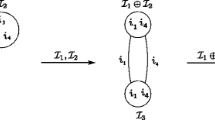Abstract
Grover’s unstructured quantum search algorithm gives a quadratic speedup over classical linear search, provided that multiple accesses to the oracle are possible. In this paper, we show that in dealing with NP-complete decision-version problems, the quantum computing paradigm still outperforms classical computation, even if only one invocation of the oracle is allowed. The superiority of the quantum approach under such a restrictive condition can often be maintained even if a simple measurement strategy is chosen. A quantum decider utilizing only Hadamard gates and measurements in the computational basis has a better chance of discriminating between a problem with solution(s) and one without, when compared to the best separation achieved by a classical decider. In addition, the simple quantum measurement strategy is remarkably close to the optimal discriminating measurement, which itself is considerably more complex to devise and implement. If we further require the decider to be unambiguous (any definitive answer must be error-free), then a general positive operator-valued measurement can be devised to classify a problem as unsolvable, with some probability, after one consultation of the oracle. Such a feature remains impossible for a classical decider, even after any less than exhaustive oracle invocations. The inherent probabilistic nature of quantum mechanics seems to be at the heart of the advantage quantum computing exhibits over classical computation, in the context of deciding NP-complete problems based on a single oracle query.



Similar content being viewed by others
Data availability
Data sharing is not applicable to this article as no datasets were generated or analyzed during the current study.
References
Barnett, S., Croke, S.: Quantum state discrimination. Adv. Opt. Photonics 1 (2008)
Bergou, J.A., Herzog, U., Hillery, M.: Optimal unambiguous filtering of a quantum state: an instance in mixed state discrimination. Phys. Rev. A 71, 42314 (2005)
Chefles, A.: Unambiguous discrimination between linearly independent quantum states. Phys. Lett. A 239(6), 339–347 (1998)
Chefles, A.: Unambiguous discrimination between linearly dependent states with multiple copies. Phys. Rev. A (2001). https://doi.org/10.1103/PhysRevA.64.062305
Chefles, A., Barnett, S.M.: Optimum unambiguous discrimination between linearly independent symmetric states. Phys. Lett. A 250(4), 223–229 (1998)
Dieks, D.: Overlap and distinguishability of quantum states. Phys. Lett. A 126(5), 303–306 (1988)
Eldar, Y.: A semidefinite programming approach to optimal unambiguous discrimination of quantum states. IEEE Trans. Inf. Theory 49(2), 446–456 (2003)
Grover, L.K.: A fast quantum mechanical algorithm for database search. In: Proceedings of the 28th Annual ACM Symposium on the Theory of Computing, pp. 212–219. Philadelphia, Pennsylvania, 22–24 May 1996 (1996)
Helstrom, C.W.: Quantum detection and estimation theory. J. Stat. Phys. 1, 231–252 (1969)
Herzog, U., Bergou, J.A.: Optimum unambiguous discrimination of two mixed quantum states. Phys. Rev. A 71, 050301 (2005)
Herzog, U., Bergou, J.: Distinguishing mixed quantum states: minimum-error discrimination versus optimum unambiguous discrimination. Phys. Rev. A 70 (2004)
Holevo, A.S.: Statistical decision theory for quantum systems. J. Multivar. Anal. 3, 337–394 (1973)
Ivanovic, I.: How to differentiate between non-orthogonal states. Phys. Lett. A 123(6), 257–259 (1987)
Jaeger, G., Shimony, A.: Optimal distinction between two non-orthogonal quantum states. Phys. Lett. A 197, 83–87 (1995)
Nielsen, M.A., Chuang, I.L.: Quantum Computation and Quantum Information. Cambridge University Press, Cambridge (2010)
Peres, A.: How to differentiate between non-orthogonal states. Phys. Lett. A 128(1), 19 (1988)
Peres, A., Terno, D.R.: Optimal distinction between non-orthogonal quantum states. J. Phys. A Math. Gen. 31(34), 7105–7111 (1998). https://doi.org/10.1088/0305-4470/31/34/013
Rudolph, T., Spekkens, R.W., Turner, P.S.: Unambiguous discrimination of mixed states. Phys. Rev. A (2003). https://doi.org/10.1103/PhysRevA.68.010301
Sun, Y., Bergou, J.A., Hillery, M.: Optimum unambiguous discrimination between subsets of nonorthogonal quantum states. Phys. Rev. A 66, 032315 (2002)
Sun, Y., Hillery, M., Bergou, J.A.: Optimum unambiguous discrimination between linearly independent nonorthogonal quantum states and its optical realization. Phys. Rev. A 64, 022311 (2001). https://doi.org/10.1103/PhysRevA.64.022311
Author information
Authors and Affiliations
Corresponding author
Ethics declarations
Conflict of interest
The authors have no competing interests to declare that are relevant to the content of this article.
Additional information
Publisher's Note
Springer Nature remains neutral with regard to jurisdictional claims in published maps and institutional affiliations.
Rights and permissions
Springer Nature or its licensor (e.g. a society or other partner) holds exclusive rights to this article under a publishing agreement with the author(s) or other rightsholder(s); author self-archiving of the accepted manuscript version of this article is solely governed by the terms of such publishing agreement and applicable law.
About this article
Cite this article
Nagy, M., Nagy, N. Quantum advantage in deciding NP-complete problems. Quantum Inf Process 22, 133 (2023). https://doi.org/10.1007/s11128-023-03889-3
Received:
Accepted:
Published:
DOI: https://doi.org/10.1007/s11128-023-03889-3




